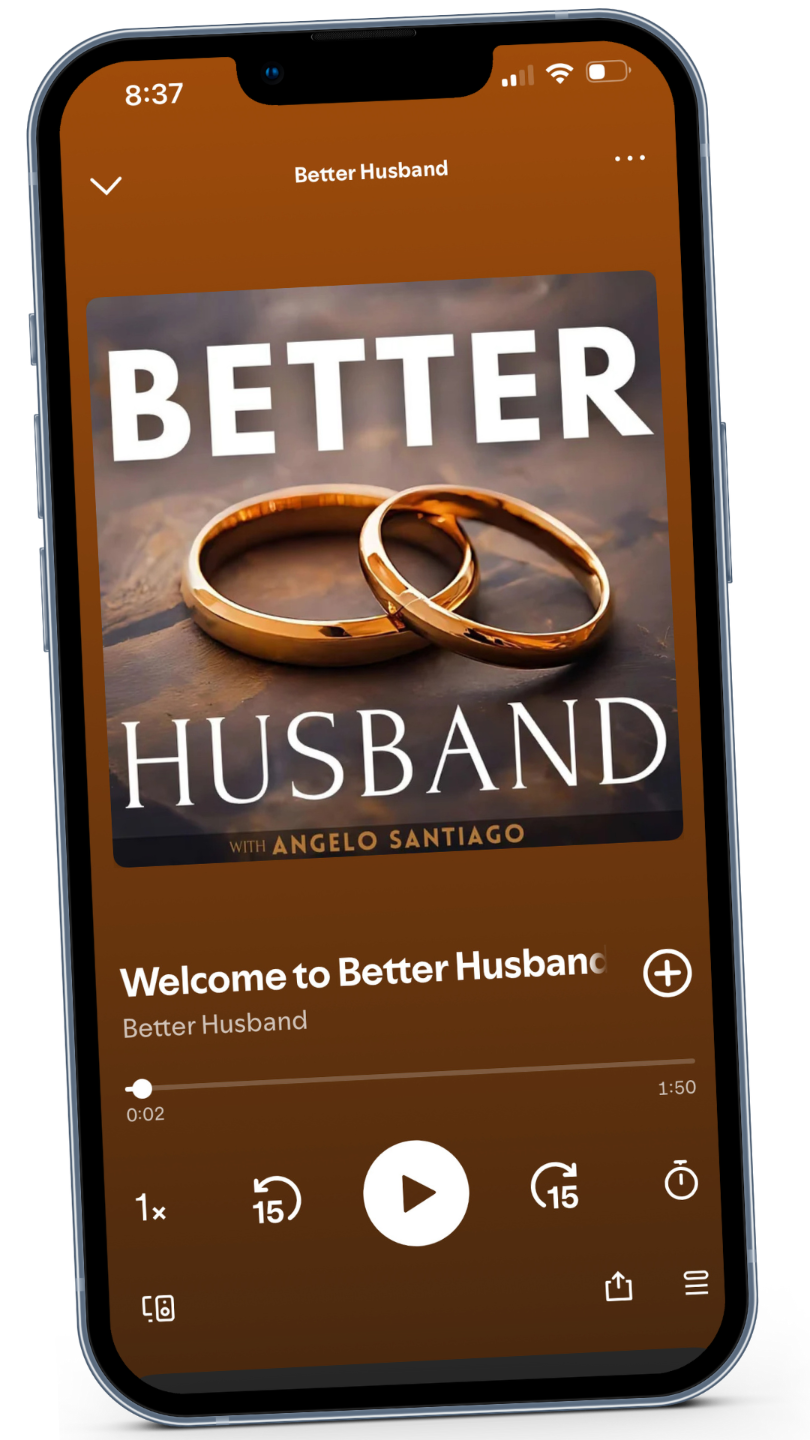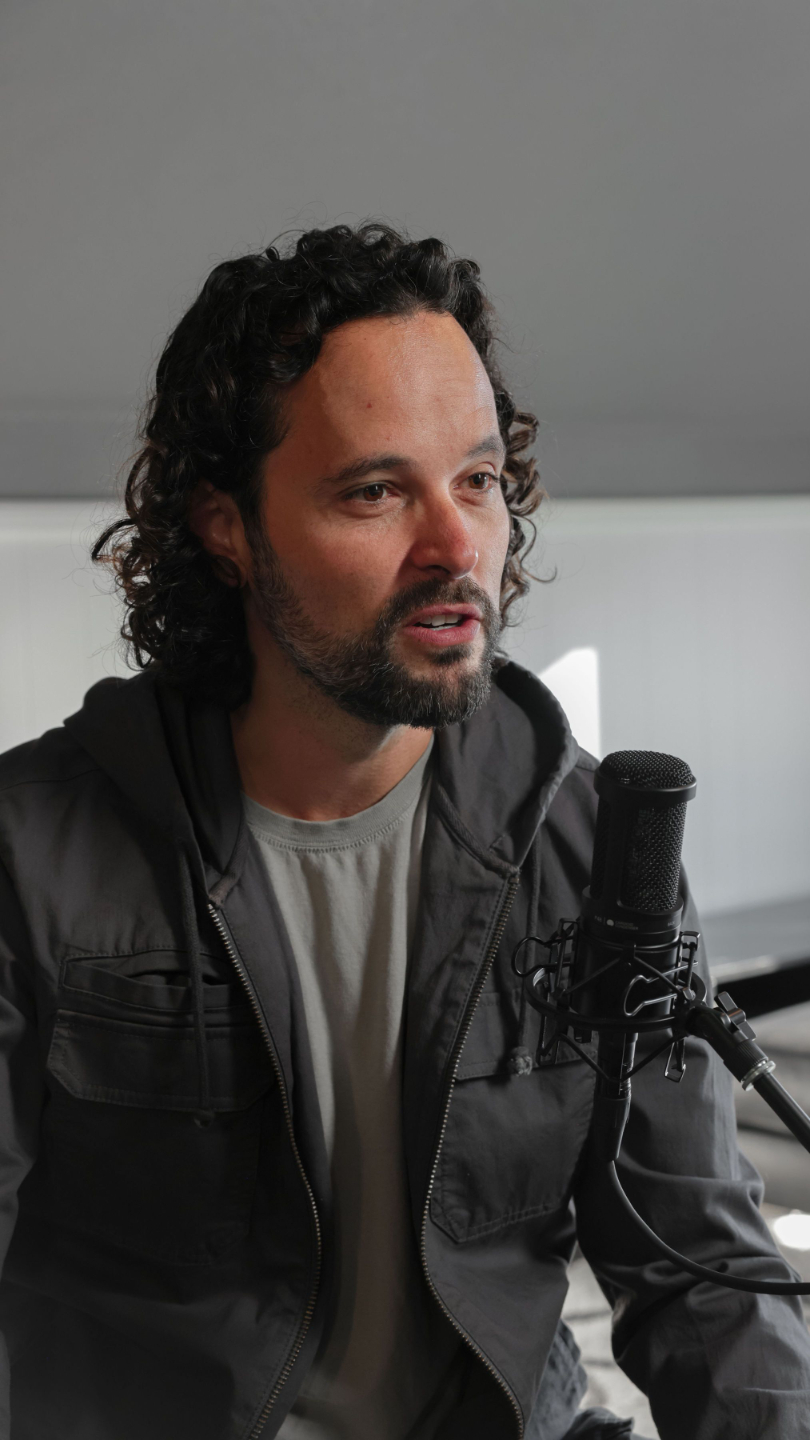Your Phone Is Stealing the One Thing Your Marriage Needs Most
When Your Marriage Starts Competing With Your Phone
Do you ever catch yourself sitting next to your wife? Not fighting, not talking, not really doing anything with each other, just scrolling. You're both on your phones, but no one's really there. Maybe you glance up and she's reading something, half smiling, half gone, and you think about saying something but you don't.
Or maybe it's the opposite. You can feel her eyes on you like she's got something she wants to say, and you just keep staring at your screen hoping the moment passes and you tell yourself. It's harmless. It's just a little space, but deep down, you know that that silence between you isn't restful, it's distance.
For me, that used to be a regular thing. I'd tell myself I was just checking something, but five minutes would turn into 30, then an hour, and by the time I looked up, she'd already gone to bed. And here's what that experience taught me. It wasn't the phone that was stealing my marriage, it was where my focus kept going.
We don't talk about this enough as men, we talk about being overworked, exhausted, stretched thin, but what's quietly destroying connection in so many marriages isn't conflict, it's distraction.
Our phones have become the easiest way to check out the place we go When we're tired, overwhelmed, or avoiding the discomfort right in front of us, and without even noticing, we start to crave that small relief more than real connection.
Today we're going to look at what those habits are actually doing to your marriage, what's happening in your brain every time you reach for your phone, and how to take your focus back so your wife doesn't feel like she's competing with a screen.
Make sure you stick around because this one's not about throwing your phone in a drawer, it's about learning how to guide your attention towards what truly matters, because that's what real relational leadership looks like.
Welcome to Better Husband, the podcast that helps you answer the question, how can I be a better husband? I'm Angelo Santiago, a men's marriage and relationship coach, and every week I bring you practical insights to help you strengthen your marriage and become the best husband you can be.
How Distraction Became My Default Mode
Now, earlier this year, I hit a point where I knew something had to change. I wasn't drinking, I wasn't burying myself in work, but I was still checking out, and my new outlet had a name, Google Chrome.
I'd already deleted the big ones. Facebook, Instagram, Twitter, LinkedIn, YouTube, gone. I told myself that would fix it.
I even felt proud, like I'd broken free from the noise. I even made a whole podcast episode about it if you caught that one earlier this year. But all I'd really done was swap one kind of numbing for another. Even without social media, I'd end up on the couch at night, scrolling through articles and random searches.
Nothing important, nothing urgent, just screen time for the sake of distraction. And it didn't look like a problem from the outside. I wasn't ignoring my family or zoning out mid-conversation. It was quieter than that. I'd think I'm just checking something real quick and the next thing I knew, 30 minutes were gone.
Then sometimes it was an hour and my wife would be beside me, reading or journaling, and I'd be off somewhere else entirely chasing another tab, another piece of information that had nothing to do with my actual life.
Then one night changed everything. We were sitting in the living room after dinner, our son was asleep. The house was nice and still, and I had my phone out. I was half reading something when she said something along the lines of, what do you think about this for next weekend?
And I didn't even look up. I just said, hold on. When I finally did look, she wasn't looking back. There wasn't any anger. There was no sigh, no frustration. She was just gone. And in that silence, I realized that it was the same pattern I fought to break years earlier when my escape was alcohol. It was a different outlet. Same result. Distance.
That moment has stuck with me because the real issue wasn't social media or even the phone itself. It was my inability to sit in stillness. To stay in the quiet moment without reaching for stimulation. And that's what so many of us miss. Our minds get so used to constant input that silence starts to feel uncomfortable.
We forget how to be still, how to simply exist with the people in front of us without needing the comfort of a screen. That's when I started experimenting with a device called Brick. And just to be clear, I'm not sponsored by them or promoting it. It was just something that helped me build a boundary. I clearly couldn't hold on my own.
It let me schedule when certain apps or sites could run and blocked everything else. During work hours, everything was open, but when family time started, everything shut down. No browser, no feeds, no endless refresh. That first week was brutal. I didn't realize how often I reached for my phone until it stopped rewarding me.
Every few minutes, my hand would go out for it at a habit, and each time I'd catch myself asking, what am I even looking for? But after that first wave of restlessness passed, something changed. The evenings grew quiet in a good way. I started noticing the hum of the dishwasher, the soft tune my wife hummed, the rhythm of my son's footsteps, the birds chirping outside.
All these little sounds had always been there. I just hadn't been tuned in. That's when it really landed. I wasn't just losing time to my phone. I was losing connection, and connection is everything in marriage. It's the difference between sharing space and sharing life.
That's what we're going to dig into today because most of us don't have a technology problem. We have an attention problem, and when you learn to be intentional with your focus, instead of letting it get pulled away, you change the way your marriage feels without adding a single new app or habit or trick .
The Digital Drift — How Your Phone Slowly Replaces Real Connection
So just to be clear, all of this doesn't happen overnight. You don't wake up one morning and decide, I'm going to choose my phone over my marriage today. It happens more like a gradual slide that starts with one small choice. A text while she's talking, an email. During dinner, a quick scroll while she's telling a story.
At first, it might feel harmless, but over time those moments string together and become the way you live. Technology doesn't just pull your focus, it changes what connection feels like. You get used to constant motion, updates, notifications, movement, real life with its pauses and silence starts to feel flat by comparison.
That's why so many men tell me they feel bored in their marriages, but can spend hours online without noticing the time go by. It's not that their relationship is dull, it's that their nervous system has been retrained to crave novelty over nuance.
Here's what that looks like. When your wife speaks softly, when she pauses, when she wants your eyes, not your answers, there's no dopamine hit in that. It's slow. It's human. And if you've spent your day chasing quick bursts of stimulation, that kind of intimacy can feel unfamiliar. So your attention begins to drift because you've forgotten how to slow down long enough to notice and appreciate her.
This kind of distance is rarely obvious. It doesn't look like resentment or anger. It looks like parallel lives. You watch your shows, she scrolls her feeds. You both tell yourselves this is just modern life until the silence between you starts feeling normal. Until one of you finally realizes I miss us, and neither of you knows what to do next.
I've seen it in the men I coach, and I've lived it myself. We start using technology as a tool, but somewhere along the way it becomes the air We breathe. We text instead of talk, multitask instead of listen, swipe instead of touch. And slowly our relationships begin to mirror that same rhythm, quick exchanges without depth.
What makes this dangerous isn't just the distraction, it's the illusion of closeness. You can be sitting side by side, laughing at the same video, sharing a meme, even texting from across the couch, and it feels like connection, but your body knows the difference. It's not the same as eye contact or tone or presence.
It's surface level comfort. Imitation intimacy. If you don't catch it, that imitation starts to replace the real thing. You don't fight more, you just talk less. You don't storm off, you just tune out, and the spaces that used to be filled with curiosity or laughter starts filling with quiet distance.
That's the drift. It's not dramatic, but it is painful. But the good news is that it's also reversible.
The first step in turning it around is understanding what's happening inside your brain every time you reach for your phone, and that's where we're headed next.
The Brain’s Escape Button — What’s Really Happening When You Reach for Your Phone
Every time you unlock your phone, your brain releases a small hit of dopamine.
It's quick, it's subtle, it feels harmless, but that one hit is enough to start a cycle. Anticipation reward. Relief and your brain learns to crave it. It's the same chemical process that fuels every habit we form, both healthy and destructive. Dopamine isn't pleasure itself. It's the signal that drives you to seek it.
It's a little voice that says, check again. Maybe there's something new. And every time you scroll, tap or refresh, your brain gets the message. This is where I go to feel better. Here's where it becomes a problem in marriage, relief and connection occupy the same emotional territory. Both lower tension, both bring comfort.
So if your nervous system learns to find that ease through a device, it eventually stops looking for it in your relationship. That's what I started noticing in myself. Whenever the air at home felt tense, a disagreement, or heavy silence, even a subtle emotional shift, I'd reach for my phone. Not on purpose, just reflex.
That quick scroll gave me enough distraction to sidestep the discomfort, but over time, I was training my mind to avoid the very moments that could have built intimacy. Our brains don't care where the hit comes from, only that it comes. It could be alcohol, porn, food work, or a phone. Different behaviors, same mechanism.
Stress. Relief, repeat. That's why so many men who've outgrown one escape quietly slide into another. They quit drinking, but they can't stop working. They delete social media, but binge the news or YouTube instead. The behavior changes, but the system underneath stays the same. The more artificial highs we chase, the less satisfaction we feel from real life.
What used to light us up - eye contact, laughter, A quiet night together- barely registers anymore. We start needing something louder, faster, brighter, just to feel alive. And when that happens, ordinary life starts to feel flat. But it's not life that's dull, it's that your reward system has been overloaded.
The good news is your brain can recover. When you start reducing those quick hits, your sensitivity returns, genuine connection starts to feel fulfilling again. The calm, steadiness you bring into your marriage becomes more satisfying than the empty rush of a scroll.
That's what's happened for me. At first, the quiet felt uncomfortable, but after a while, I realized what I used to call boredom was actually peace.
My nervous system had to relearn that. Safety doesn't come from escape. It comes from being present. And that's the real goal here. Not rejecting technology, not blaming dopamine, but reclaiming focus as a form of leadership.
Because when you stop chasing constant stimulation, you create room for real connection to grow. Next, we're gonna talk about why so many men use distraction as a shield and how to recognize when just checking your phone is really a way of running from something deeper.
Escaping the Moment — When Checking Out Turns Into Shutting Down
Most men I work with don't realize how often their phone use isn't about curiosity or entertainment.
It's about avoidance, avoiding conflict, avoiding tension, avoiding the feeling of being needed. When you're already running on empty, it's easy to tell yourself. You're just relaxing, just taking a break. But That break often becomes an escape. You've had a long day, your wife wants to talk, your kid's asking for help.
The dishes are still in the sink and suddenly checking your fantasy team or scrolling. YouTube feels like the only thing you can control. You're not consciously saying, I'm avoiding my family. You're saying I just need a minute. But that minute becomes an hour and that hour becomes a habit.
You get to escape the weight of responsibility, but you also lose the chance for connection. I call this comfortable numbness because it doesn't look destructive and in our society it's accepted, but it quietly wears down closeness. What makes it tricky is that digital avoidance often disguises itself as productivity or learning.
You tell yourself, I'm reading something useful. I'm staying informed. I'm working on myself, and maybe you are for a little while, but eventually you're not feeding your growth, you're feeding your avoidance. You're searching for something to pull you away from the present moment because the present moment feels like work.
I know this because I've done it when my marriage was at a low point. I didn't reach for alcohol anymore. I reached for busyness. I worked, I studied, I researched ways to be better. It looked noble, it sounded mature, but really I was terrified of slowing down enough to face what was right in front of me, my wife's sadness, my own guilt, the distance between us that I didn't want to name or some other uncomfortable truth.
And my phone became the perfect hiding spot, small enough to carry powerful enough to keep me from feeling what was real. That's the danger of distraction. It feels safer than honesty. It lets you avoid the vulnerability of saying, I don't know what to do here. It gives you a quick way out when she's hurting, and you don't have the right words yet.
But what begins as self-protection eventually becomes disconnection, because every time you turn away from discomfort, you're also turning away from intimacy. The truth is connection is built in discomfort. It's built by staying with those moments long enough to go deeper, to really see each other, to feel each other.
Your phone offers an exit, but leadership means staying. It means noticing when you're tempted to check out and choosing to remain in the moment instead, that's how genuine presence begins. Now by removing every distraction, but by facing what you've been trying to avoid. Next, I wanna explore how to set real boundaries with technology.
So your focus starts serving your marriage instead of competing with it.
Reclaiming Presence — How to Guard What Matters Most
Taking back your focus isn't about throwing away your phone. It's about remembering that your attention is power, and right now it's being sold to the highest bidder. Every notification, every algorithm, every recommended for you, video is fighting for it, but inside your marriage, that same focus is what communicates love.
. When you sit across from your wife and she's sharing about her day and you resist the pull to glance at that buzzing screen, what you're really saying is that you matter more than whatever's trying to pull me away. When you put your phone down during dinner, you're saying that this moment here counts.
That's how intimacy and connection is rebuilt. I started calling this mindset guarding my attention because guarding is about protecting what matters most. It means being aware of what deserves access to you and what doesn't, and that's something every man can practice. One way I do this is creating real boundaries for myself.
Here's how it works. I have a few clear guardrails for when and how I use my phone, especially when my family's around. No screens during meals. No phones in the bedroom, and no mindless browsing. The brick device, which I mentioned earlier in the podcast, helps. But honestly, it's not about the tool, it's about the commitment.
It's about asking what kind of energy do I want in my home? Do I want distraction or connection? And here's what I've noticed. When you start protecting your focus, everything around you starts to shift. Conversations feel easier. You soften. Even the energy in your house changes because as I've said before, your calm presence regulates everyone else, especially your wife and kids.
When you're grounded, they don't have to fight for your attention. Now being present doesn't mean you never slip. You will, you still get distracted sometimes, but each time you catch yourself and come back, you're reinforcing a new standard for yourself. That return is what matters because every time you come back, you're choosing intimacy over escape.
There's another benefit I didn't expect when I started doing this. When you stop pouring yourself into your phone, you start coming back to life. Your creativity comes alive, your energy returns. You start noticing again the way your wife laughs, the sound of your home. When it's peaceful the way time slows down when you stop rushing towards the next screen.
You start to actually feel and appreciate your life again. That's the work here. It's not anti-technology, it's pro connection. Next, we'll break this down into simple steps. You can start practicing right away real practical ways to create digital boundaries that support your marriage instead of competing with it.
Putting It Into Practice — How to Bring Your Focus Home
So let's put this into practice. If you've been listening and seeing yourself in some of this, the goal isn't to feel guilty or to shame yourself as having messed everything up. It's to get intentional and commit to change. Real change doesn't come from deleting every app or locking your phone in a drawer.
It comes from awareness rhythm and one clear choice at a time. The first step is simple. Decide what truly matters in your home and give your energy to that. First, when you walk through the door before checking a notification or refreshing something new, pause for a breath and ask yourself, what deserves me right now?
Most of the time the answer isn't glowing in your hand. It's standing right in front of. The second step is to build what I call a return ritual. That's the moment you consciously transition from the outside world into your family's world. For me, it's placing my phone on the kitchen counter when my son gets home from school and we stop working for the day and leaving it there for the first 30 minutes. I don't touch it.
I reconnect with my wife and my son first. You can make it your own. Just make it something that tells your nervous system. I'm here now and it's time to connect.
The third step is identify the windows of time that matter most for closeness and protect them. Dinner, bedtime, the first few moments of the morning.
These are high value moments. If you can guard just those few spaces each day, you'll shift the entire atmosphere of your marriage without having to overhaul your entire routine. And finally, if you really want to rebuild calm and focus, try a short digital fast once a week. It doesn't need to be extreme.
Maybe it's one evening without your phone or a Sunday morning that's just you, your coffee, and the people you love. And notice what happens in that quiet. The restlessness, the stillness, the reflex to reach for it. That awareness alone shows you how deep the pattern runs and how much freedom you can reclaim by interrupting it.
All of this works because it's not about restriction, it's about direction. Every boundary you create around technology becomes an act of care.
Before we close, I wanna leave you with a few questions to sit with ones that can help you see where this might be showing up in your home.
When do you reach for your phone the most? And what are you actually feeling in that moment? Is it boredom, stress, avoidance, or just habit? What would it look like to turn towards your wife in that moment instead of your screen? Where in your day do you drift most easily? The dinner table, the couch at night, those quiet minutes before bed.
And what single boundary could you create to make that time feel sacred again? And here's one more. If your wife were asked how often she feels you truly with her, not just nearby but engaged, what do you think she'd say? What would it take to change her answer?
These questions are invitations to wake up a little more each day.
Every man I've coached who's done this work has discovered the same truth. His marriage didn't need him to be more romantic or more perfect. It needed him to be present.
Your phone isn't the enemy. It's a mirror. It shows you where your focus is going when you're not being intentional about it. So start choosing, guide your attention the way you want to guide your life.
Final Takeaway — Where Your Attention Goes, Love Grows
Here's what I want you to take away from this episode. When you really think about it, focus is the most intimate thing you can offer someone because wherever your focus goes, your energy flows.
And in marriage, that's what creates closeness. The small, steady moments where you show your partner that you're truly there. Each time you stay engaged, each time you resist the urge to drift away, you're shaping the atmosphere of your home. You don't need to delete every app or disappear from the world.
You just need to notice what's already in front of you. A partner who wants to fuel you near a family, that breathes easier when you're grounded and a life that's waiting to be lived, not scrolled past. That's what this is really about. Not striving for more, not chasing productivity, just being deliberate with where you place your attention.
If this episode spoke to you, I'd love to hear about it. Tell me what stood out or what you're planning to practice this week. You can leave a comment if you're listening on Spotify or a review on Apple. If you know someone that needs to hear this, share this episode with them. These are conversation that help all of us grow.
Thanks for listening. I'm Angelo Santiago, and this is Better Husband.







